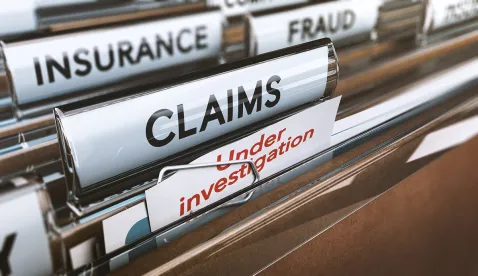In this exclusive expert video briefing from the IMS COVID-19 Research Insights Series, we speak with Insurance Industry Expert, Dale Crawford, about reinsurance as it relates to COVID-19 insurance claims.
Chris Ritter: Dale, I periodically hear reference to the concept of civil authority. Could you explain a little bit about that and how that may apply to these kinds of claims?
Dale Crawford: Yes, there is a provision in a lot of policies of loss due to the requirement of a civil authority. In other words, when the authorities shut down a business, they shut down a street, they shut down a city or something like that. You're going to have to look at the exact terms of each policy to see if there is a virus exclusion in a policy, but yet, there is coverage for a loss of operations due to the requirement or order of civil authority. Which one of those would apply? How do they work up one against another? We don't know.
Crawford: Manuscript policies will have to be looked at for their own provisions as to how these things will apply.
Ritter: For people who may not be as familiar with the insurance industry, a manuscript policy is one that is specifically drafted for the insured.
Crawford: Yes, that's correct. That's the term for a large policyholder who has negotiating power with an insurance company over its coverage. This is something where the two sides work out the various forms of coverage. There are a lot of standard forms of coverage, particularly for the smaller businesses, but for a large hotel chain or cruise line, it's probably going to be a manuscript, something that was negotiated at great length between the two parties.
Ritter: You mentioned reinsurance type claims. Can you explain to people who are watching what types of claims we're talking about there and how you see those issues playing out?
Crawford: Yes, the reinsurance industry will be involved heavily without doubt, because of the magnitude of the claims. Of course, the terms in a reinsurance contract are different than the terms of the insurance policy that it reinsures. Sometimes you have a conflict between the nature of the coverage in the insurance policy that is underlying and that produces the claim and the coverage in a reinsurance contract.
Crawford: I would strongly suspect that over the years once reinsurers get involved, there may be questions and disputes involving this and arbitrations come out of this as a result, between insurers and reinsurers.
Ritter: Historically, in huge claims such as this, Dale, the definition of occurrences and how the court interprets the number of occurrences has been an important issue. Do you see that as something that's going to be important as we move forward?
Crawford: I strongly suspect that it will, and I think each type of policy, the specialty policies that deal with the out of the ordinary circumstances will come into play. For example, one of the thoughts is event cancellation insurance. Now, is the virus itself one occurrence? Or is every event, every concert, every show, every musical production that has to be canceled, is that a separate occurrence? I think you're going to have to go back to the individual policies to see how that's treated.
Crawford: There may be some issues because this is what I've described as the Black Swan event that nobody really anticipated. Did the underwriters anticipate this, and did they put provisions in there that defined whether the cancellation of a dozen contracts is one occurrence or is the cancellation of one concert an occurrence?
Crawford: And as an underwriter, you would anticipate probably a single event. You wouldn't really be thinking about concerts being canceled far and wide, but maybe one concert canceled because of who knows whether the performer, anything, and an insurer can absorb one or maybe a dozen losses, but can the same insurer absorb 100 losses, we don't know.
Crawford: So this could have a big effect on the solvency of an insurance company conceivably.
Ritter: Just to pursue that. If the Rolling Stones are on tour and they're going to be doing fifty tours, the underwriter may anticipate that the weather will be such they're going to have to cancel one tour and price accordingly. But this is an instance where the entire concert series has been canceled and there may be a loss of fifty different concerts. Is that basically it?
Crawford: That's exactly it, yes. Is the insurer able to absorb that without going into their reinsurance? Do they have reinsurance? Do they have the capacity? Do they have the solvency to handle 100 concerts being canceled?
Ritter: Eventually there's going to be claims being brought against the reinsurers. Again, for people who are not really versed in coverage, the reinsurers are the ones who, by the way of a treaty or an agreement agree to cover some of the losses that the insurance company has covered. Is that right?
Crawford: Exactly. Every company has reinsurance for some reason or another, at some level. Obviously, the big companies don't need it that much. But even a giant insurer wants to have protection in the case there's a Hurricane Katrina or something of that nature that wipes out thousands of homes, as one example. The reinsurance industry is there to respond to smooth out the results to enable companies to stay in business when there's the unexpected, unanticipated large losses.
Ritter: In those kinds of claims, what are some of the issues that may arise that you might not ordinarily see under some of your basic, early coverage claims between the insured and the insurer?
Crawford: The coverage for the policyholder of course is determined by the language in the insurance policy itself. But then the language as to how the reinsurance applies may be an entirely different situation.
Crawford: The reinsurance industry is one that operates a little bit different in the relationship with its customer than you normally have in the world of commerce. I have treatises about reinsurance that say that in a dispute, the arbitrators are required to look beyond the wording of the contract. It's an agreement of utmost good faith. You try to look at the intent of the drafters of the contract at the time that it was drafted. Those things have evolved through the asbestos and environmental claims that we've seen over the last twenty or thirty years. What did they mean when this contract was drafted in 1955, and nobody had heard of the types of losses that are being presented today?
Ritter: It goes back to that basic principle that insurance is, in fact, a contract. One of the basic elements of interpreting a contract is to go back to see the party's intentions.
Crawford: Exactly, particularly in reinsurance where it is equal parties negotiating the coverage in each situation.
Ritter: You've mentioned asbestos, you've mentioned environmental. Do you take any lessons away from those, either with respect to claims handling or how insurers may respond? Anything, I mean, does the past help us predict the future in any way?
Crawford: I think in this instance, it might. The way that the insurance industry and the reinsurance industry evolved to handle claims that were unanticipated may provide us somewhat of a roadmap in certain situations for anticipating the resolution of claims that will be coming as a result of the virus. Where that will take us, we don't know yet. But precedent in the industry is like in the law too. You try to look at it, to give yourself a roadmap as to what the intent was of the parties at the time.
Ritter: You mentioned public policy. How are you anticipating public policy to play a role here?
Crawford: That's a good question. One of the first thoughts about that would probably be the virus exclusion in most standard policies for business interruption. Was this against public policy? Was this unanticipated by the purchaser of insurance, as well as the issuer of the policy? We don't know. Again, there are a lot of lawsuits, litigation in this area has already started. Exactly where that will end up, where that will play out, is going to be a big unknown.




 />i
/>i

